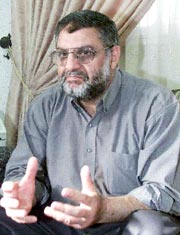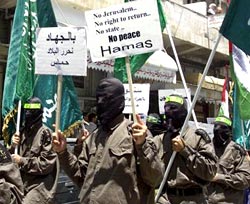|
Hamas
Breaks Off Dialogue With Palestinian PM
 |
|
"Abu
Mazen closed the door to dialogue by himself," Rantisi said.
|
GAZA
CITY, June 6 (IslamOnline.net & News Agencies) - The Islamic
resistance movement Hamas, in a surprise move, said it will not hold
talks with the Palestinian prime minister Mahmoud Abbas on halting
attacks on Israelis, a leader of the group said Friday, June 6.
"Abu
Mazen (as Abbas is commonly known) does not represent us, and we
refuse to meet with him because there is no point to it," Abdul
Aziz al-Rantissi told Agence France-Presse (AFP).
Rantisi
said that Abbas made too many concessions to the Israelis in his
speech at the Mideast summit in Jordan at a Mideast summit
held earlier this week in Jordan under the auspices of U.S. President
George Bush and also attended by Israeli Prime Minister Ariel Sharon.
The
summit in Aqaba "declared war on the Palestinian people,"
and the Abbas' government was not doing anything for legitimate
national rights, he said.
Abbas
had caved in, effectively "fulfilling all the wishes of
Sharon" by "giving away historical Palestinian rights,
notably on Jerusalem, the right of refugees to return and the freeing
of prisoners," Rantissi said.
"Abu
Mazen closed the door to dialogue by himself," Rantisi said.
"He committed himself in front of Bush and Sharon (to) what
Palestinians refused."
Rantissi
also called for massive demonstrations Friday to protest the
"dangerous results" of this week's peace summit in Jordan,
which brought together Abbas, Israeli prime minister Ariel Sharon and
U.S. President George W. Bush.
He
said the demonstrations, following Friday Muslim prayers at midday,
would take place at several refugee camps in the Gaza Strip, as well
as the Gaza towns of Rafah and Khan Yunis.
Another
demonstration was slated for Friday night in Gaza City.
Rantissi
made the comments a day after Israel assassinated
two Palestinian activists in a raid in the West Bank city of Tulkarm.
At
the summit on Wednesday, June 4, Abbas said there was "no
military solution to our conflict. We repeat our denunciation and
renunciation of terrorism and violence against Israelis wherever they
might be.
 |
|
Demonstrations,
following Friday Muslim prayers at midday, would take place at
several refugee camps in the Gaza Strip, as well as the Gaza towns
of Rafah and Khan Yunis
|
"We
will exert our full efforts using all our resources to end the
militarization of the intifada, and we will succeed. The armed
intifada must end, and we must resort to peaceful means in our quest
to end the occupation, the suffering of the Palestinians and the
Israelis, and to establish our Palestinian state.
Hamas,
its smaller rival, Islamic Jihad, and two secular radical groups have
already announced in response that they will refuse to lay down their
arms.
Abbas
had said on May 29 he expected to reach a ceasefire agreement with
Hamas this week, a forecast that now appears to have been overly
optimistic.
"I
believe that next week I will reach a ceasefire agreement with
Hamas," Abbas told the Israeli daily Yediot Aharonot.
"Hamas
will undertake to stop terrorism both inside the Green Line and in the
territories," Abbas said. "In the wake of the agreement with
Hamas I hope also to reach an agreement with the Tanzim and Islamic
Jihad, but we have not had a chance to meet yet."
The
word Tanzim refers to armed groups linked to Fatah, the party founded
in the late 1950s by Palestinian leader Yasser Arafat and Abbas, and
the most important of which is the Al-Aqsa Martyrs Brigades.
The
Green Line is the line separating Israel from the West Bank.
"We
are engaged in talks on this subject with the organizations' leaders
abroad and with the activists in the prisons," Abbas added.
Rantissi
suggested at the time that the Yediot story was putting too optimistic
a spin on the situation, saying he did not consider the newspaper to
be a reliable source.
He
said "Hamas is still discussing the issue at the highest level
but we haven't reached a decision for the moment.
"Our
position is unchanged, we agree to stop attacks against Israeli
civilians if Israel stops its aggression against our people, the
incursions and the assassinations. For a real ceasefire, we need
attacks to be frozen on both sides."
When
he was sworn in to office in April, Abbas vowed to disarm resistance
groups in a bid to put an end to 32 months of bloodshed and implement
the internationally drafted peace roadmap, which was the subject of
Wednesday's summit.
|